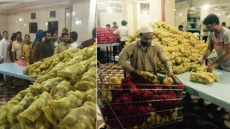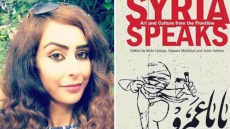SHAH SADDERUDD, Pakistan — Like most of the men in this village of mud homes and wooden carts pulled by water buffalo, Muhammed Azeem cannot read or write. Like the other fathers, he raised a family of six boys and three girls on whatever he could coax out of a soil baked by the searing Punjab sun.
But in a culture where a family's worth is tallied in the number of males it can produce and girls are second-class citizens at best, Azeem was different.
He valued his daughters as much as his sons.
He raised them to be independent young women. When one of the girls married, she refused to take her husband's name. Another changed hers to Qandeel Baloch and became famous, shocking this conservative Islamic country with risqué dance videos that showed her in skin-tight clothing grinding against men.
Azeem didn't care. He loved Qandeel - whose new name meant "torch" in their native language.
"I supported everything she did," Azeem says, tears glistening on his weather-beaten face. "I liked everything she did."
Her father's love helped make Qandeel a role model to a generation of young Pakistani women. But it also may have planted the seeds of her destruction.
Her younger brother Muhammed Wazeem seethed. It was bad enough that he couldn't compete with his sister for their father's affections, and lived in a home that she paid for. But even worse was the relentless sniping from villagers. Storekeepers would show him her Facebook posts on their phones, criticizing his family for allowing her to make the videos.
He decided he had to save the family's "honour." Last month, he drugged Qandeel and then, as their parents slept downstairs, strangled her.
In most so-called honour killings, families close ranks around the killer. But Qandeel's father wants his son punished.
"My son was wrong," Azeem said. "I will not forgive him."

A social media star, who was abused by a husband who burned and beat her, Qandeel paid with her life for refusing to live a life dictated by repressive tribal traditions and religious edicts defined by clerics who espouse a narrow and repressive brand of Islam.
Qandeel Baloch, provocative media star, who was killed by her brother was born Fauzia Azeem, to a dirt poor farming family, raised in a mud house baked by the searing sun of Pakistan's Punjab province.
This is the story of a girl from one of the poorest, most backward areas of Pakistan who emerged to transfix a nation - and then was killed for her role in its clash between tradition and modernity, between Islamic fundamentalism and secularism.
It is a paradox of today's Pakistan, a deeply religious country where 4G service and social media have arrived in even the most isolated communities, that one family could produce a wildly untraditional daughter and a son so traditional he felt compelled to kill his sister for her 21st-century ways.
Qandeel's home village, Shah Saddaruddin, is a seven-hour drive from the capital, Islamabad, a journey through sugar-cane and mango fields, often on roads that are no more than dirt tracks. Murky streams and canals flow through a vast countryside owned by feudal landlords who keep their workers deep in debt.
Most girls are hidden away once they reach puberty, and many are married shortly afterward to a boy chosen by their parents. Occasionally, women are exchanged to pay off a debt, or to settle a dispute.
"Women here are strictly controlled," Qandeel's sister Munawar Azeem says. "It's our tradition, but Qandeel was stubborn, she always wanted more, had different ideas."
She says she'll never forgive her brother for killing her sister, who was only 26 when she died.
Her father loved the girls "too much," Munawar says, as if sensing that his esteem was too great for their deeply traditional society.
The girls lived in a country that sees 1,000 honour killings a year, most of them targeting women. A woman can even be punished for something a male relative may have done. In a nearby village in 2002, a young woman named Muktar Mai was gang-raped by four men and then paraded naked through the village.
The ordeal, it turned out, was retribution for alleged sexual advances her 12-year-old brother had made toward a girl.
Mukhtar Mai stunned villagers and inspired Pakistan when she stood up to her rapists and public humiliation. She went to court, demanded their punishment and started a charity to educate young girls. Her courage became legendary.
In her own way, Qandeel was just as revolutionary, thumbing her nose at tradition with her provocative videos that amassed millions of views - and thousands upon thousands of thumbs-down.
Her rebellion began long ago, when she was still a little girl named Fauzia.
One day she saw her older brother practicing karate and judo. Every day after that, the 8-year-old could be found outside working on her martial arts moves.
Her mother, Anwar Bibi, smiles at the thought of her daughter.
"I don't know why she was the way she was, but she never cared what anyone thought," Bibi says. "She was always brave."
Fauzia thought maybe she'd join the army. Or no, she'd be a pilot.
"She would look at the sky and she would say: 'Papa, I want to fly. I want to be like a bird,'" her father says.
Eventually Fauzia settled on becoming a star. She watched Indian soap operas on television and read fashion magazines. She told her mother she'd be famous one day.
After becoming Qandeel, her first public performance was in 2012 on "Pakistan Idol," a local offshoot of "American Idol." It was a disaster.
Judges cringe as she sings, finally pleading with her to stop. Her appearance ends with her being escorted off the stage and sobbing backstage. The video went viral.
Her notoriety grew when she posted a seductive video earlier this year offering to strip-tease for the Pakistani cricket team captain if Pakistan won its match against rival India. (The team lost.)
Her tweets were sometimes titillating - "Am I Looking Hot? 3 Yess I Know M Looking Damn Hot 3 3." But self-empowerment was a recurring theme: "I am Special..I will Remain Special.I will Dare to do different things which people will never Dare to do."
Torrents of condemnation inundated Qandeel's Facebook page. One user wanted her arrested for "spreading vulgarity." One with a rudimentary grasp of English wrote, simply, "We hete you."
But she inspired many others. One wrote: "You are strong like men," and another said: "Fabulous style and confidence. U r such a superstar my QB."

Qandeel's transformation from fame-hungry celebrity to fledgling feminist may have its roots in her short marriage, one she said was marked by abuse.
It seemed like a love match at first. Unlike many here, it wasn't an arranged marriage. She fell for a family friend.
Ashiq Hussain, her ex-husband, lives in a village called Mozza Tarryaie, where a single buffalo is tethered outside the mud house he shares with his four brothers, their wives and 15 children as well as his elderly parents.
As Hussain tells it, Fauzia would pursue him, writing him letters.
"Even sometimes she would use her own blood to write," he says.
"There was no Qandeel then. She was Fauzia."
During their marriage of less than two years, he recalls, she was obsessed with moving to the city, buying a house and wearing pretty clothes.
"Maybe in her heart she was already thinking of being a star," recalls Hussain. "But I told her before marriage: 'I am a poor man, a very simple man. You knew I could not give you more.'"
After a year they had a son, Mishal. He resembles his mother, sharing her round brown eyes and full lips. But he doesn't remember his mother, and he is quiet, almost sullen.
Qandeel fled the marriage, accusing her husband of beating and torturing her — a charge he denies. She was widely condemned for abandoning her son, but she said their families forced her to leave Mishal behind.
During her sensation-filled life, many critics dismissed Qandeel's claims of abuse. But when Qandeel's body was bathed before being buried, in keeping with tradition, her mother saw the scars, says her neighbour Saba Munir.
Munir gestures to her own hip to show where Qandeel had been badly burned. The scar, she says, was very large.
___
If any moment captures Pakistan's earthshaking clash of cultures, it is the selfie Qandeel took with her ever-present phone two months ago, in the middle of the holy month of Ramadan.
In it, she is almost sitting on the lap of Muslim cleric Maulvi Abdul Qavi in a Karachi hotel room. She wears his pointed cap perched above her arched brows and flaring eyeliner. Her mouth forms an exaggerated "O'' of surprise and sexuality.
As outrage exploded over the photos, the two engaged in a furious round of he-said-she-said. The cleric said Qandeel had asked for the meeting, and he agreed because they both came from south Punjab. Qandeel said it was Qavi who had sought the meeting — and had insisted it be in a hotel room.
Qandeel's parents say she began to get threats on her life after the notorious selfie.
"Before that everything was stable, but after that everything changed," her mother says.
On a recent day, Qavi sits cross-legged on the floor of his office in Multan, the Punjab city where Qandeel was killed in the home she had rented for her parents and her 22-year-old brother. Members of his entourage surround the chubby mufti; one of them fans the cleric, trying to protect him from the oppressive 113-degree heat.
Leaning against a cushion, Qavi wears the indulgent smile of a parent with a misbehaving child as he's asked about Qandeel's accusations that he drank juice in daylight hours during Ramadan, when the devout are meant to fast from dawn to dusk. But when asked about police promising to investigate his possible involvement in inciting violence against Qandeel, he struggles for composure.
"The main thing is, it is condemnable," he says, referring to her killing.
Not everyone, however, has condemned the killing.
"A girl who decides to publish her naked pics for sake of publicity...what her brother is sppose to do???" one tweet said.
In addition to Wazeem, police have arrested a cousin in connection with Qandeel's death, and are looking into the possibility that other brothers may have encouraged him in the killing.
Multan police officer Muhammed Azam Akram thinks the growth of social media is threatening Pakistani society, and the government must do something to regulate posts like Qandeel's.
"She was hungry for fame," he says. "She became popular, but not in a positive means."
Qandeel belonged to the first generation of Pakistanis who are truly connected, tapping little hearts on their smartphones to "like" Instagram and Twitter posts. They want to be part of the modern world, with the freedom to challenge the older generation's restrictive interpretations of how they should live according to Islam.
Social media gave Qandeel a platform to push the envelope on tradition, but it also left her vulnerable to radicals who troll the internet, inciting hate.
"Saw some photos/clips of Qandeel Baloch... what a slut! Disgusting," one tweet said, going on to use a deeply misogynistic word.
The day before she was killed, Qandeel tweeted: "As a women we must stand up for ourselves. As a women we must stand up for each other...As women we must stand."

At Qandeel's grave in Shah Sadderuddin, her sister Munawar points to half a dozen young men who have gathered there to praise the dead woman.
"Look at them," she says. "When she was alive, everyone said horrible things about her, and now they come and pray at her grave. See what hypocrites we are."
The brother who killed Qandeel was more hotheaded than devout, police officials and family members say. Wasi, as everyone called him, even had a girlfriend, one police official said. But he couldn't bear the public ridicule, and finally said he either was going to kill his sister or himself.
He chose his sister.
Qandeel's father is devastated by her death.
His daughter, he says, "was more of a son" than any of his six sons, providing for the family.
"We were never short of anything. We had everything," he said.
Now he holds his son's fate in his hands. If he refuses to forgive the boy, Wazeem may be given the death penalty, and a father who weeps for his daughter also will lose a son.
"I am ruined today," he says.
"I miss her face. I miss how she looked. I miss the way she would speak. I miss everything of her. You were my daughter. God gave you fame. May God bless you."



